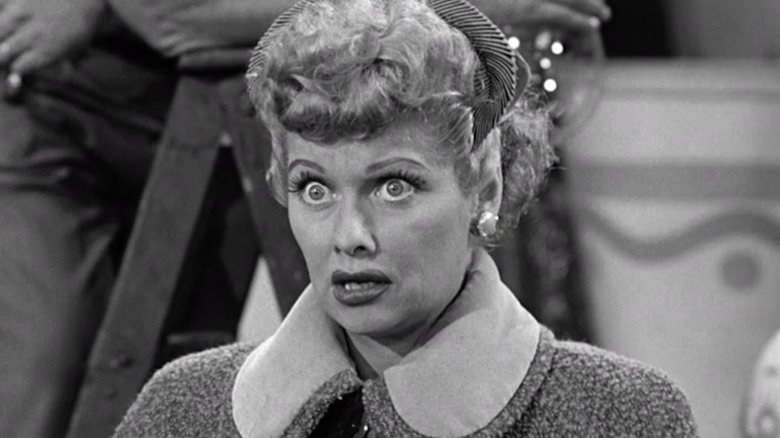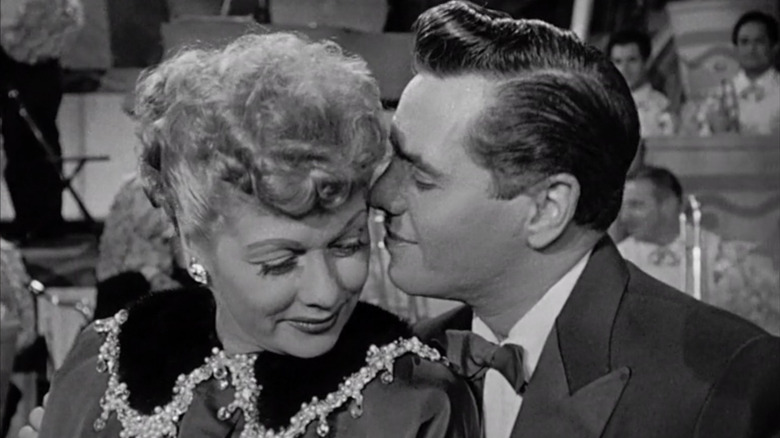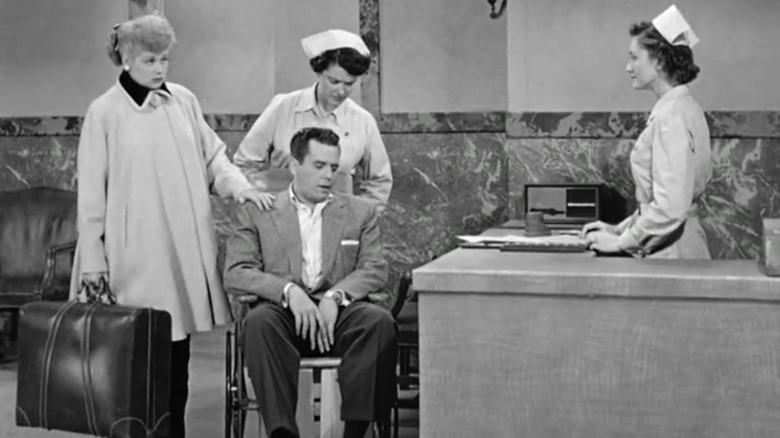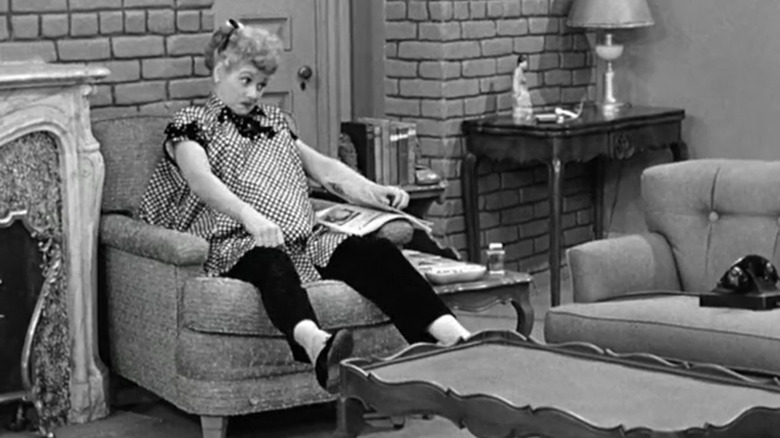I Love Lucy Turned Into Chaos Behind The Scenes When Real Life Threatened The Show
Something I think a lot of film and television fans forget is how everyone who helps create those films and shows are just going to their jobs like any other person. Just like everybody else, a work-life balance needs to be struck in order to live a fulfilling life. Not everything an actor, director, writer, or any other cinematic professional does is in service of the business. They go on vacations, go home to their parents' house for Thanksgiving, have relationships, and decide to have children.
Chances are good that someone in your office has been pregnant and only stopped coming in when they went into labor. In terms of the day-to-day work life of pregnant people, not much changes, aside from it maybe taking a little more effort to do things than usual. For an actor, however, it is one of the few jobs where your physical appearance matters a great deal, and if someone is visibly pregnant, it wouldn't make much sense for them to be playing someone who isn't.
With the extended production schedules of television, getting around this can be quite tricky, and there are generally two options. Shows like "Seinfeld" and "The Americans" got around the pregnancies of their leading ladies with clever blocking and prop work to constantly cover the stomach areas of the actors. Rarer are the occasions where it's simply written into the show that the character gets pregnant, and one of the first major instances of this on American television was in "I Love Lucy." While that sounds perfectly harmless today, back in the early 1950s even acknowledging that someone was pregnant on TV was a major no-no — especially for one of the biggest shows on the air.
When a sponsor gets in the way
American network television has always been sponsor-driven. Big companies' advertisements let shows keep the lights on, as public funding for the arts in this country has always been pretty terrible. Back in the day, TV shows would have one chief sponsor who would be "presenting" the show. In the case of "I Love Lucy," the corporate benefactor was the tobacco company Philip Morris, back when cigarette ads were commonplace.
During the production of season 2, Lucille Ball became pregnant, and she and her husband, Desi Arnaz, wanted to introduce that storyline into the show. Philip Morris, however, didn't want that to happen. They'd let them acknowledge it for an episode or two, but that was it. For Ball, Arnaz, and producer Jess Oppenheimer, that wasn't going to cut it. Oppenheimer writes in his memoir "Laugh, Luck ... and Lucy: How I Came to Create the Most Popular Sitcom of All Time" about how Arnaz put the pressure on Philip Morris to let them do it:
"Desi sat down and fired off a letter to Alfred E. Lyons, chairman of the board of the Philip Morris Company. In it he pointed out that until then, with the creative decisions in our hands, we had managed to give Philip Morris the number one show in the country. If Lyons agreed with the people at Philip Morris who were telling us what not to do, Desi told him, then Philip Morris must also take responsibility from then on for telling us what to do — and for whatever consequences that might have on our ratings."
With that kind of threat, Philip Morris was quick to reverse course and let them make Lucy pregnant. However, CBS still had some notes as to how that story would be told.
They're expecting, not pregnant
A major sticking point with CBS, the network who aired "I Love Lucy," was the use of the word "pregnant." For some reason, the network believed this word would be morally upsetting to a certain percentage of viewers. It's not as if they were saying "Lucy and Desi be f***ing," just that she was pregnant. Well, CBS wouldn't allow that; instead, euphemisms like "expecting" or "with child" had to be used. Putting the emphasis on the fetus rather than Lucy's physical condition, I guess, made for a more wholesome viewpoint. Of course, this contributes further to the idea that women are merely vessels for childbearing, but we don't really need to get into that right now.
Even with this change, CBS was still rather squeamish about the whole endeavor. Moral outrage has always been something TV networks have worried about. To assuage their fears, Jess Oppenheimer came up with an idea that it both enormously stupid and effective. He writes in his memoir:
"I was in my office at the studio one morning, preparing for another in what seemed like endless series of meetings on the subject, when I had an idea that I thought would go a long way toward making CBS more comfortable. Why not arrange for a priest, a minister, and a rabbi to approve each of the 'baby show' scripts, and to attend each of the screenings? If any of them found anything objectionable, we would simply remove it!"
So, if you thought that one clergymen scene from "Hail, Caesar!" was a little far-fetched, just know it is pulled straight from real life instances like this. Religion has such a stranglehold on America that they had to waste people's time with this. But they got their pregnancy story.
Rearranging the schedule
Pregnancy is something you can prepare for, but it's not something you can perfectly plan, particularly before our current age of modern medical practices. Lucille Ball got pregnant towards the tail end of the first season of "I Love Lucy," and she was due in January 1953, which is smack-dab in the middle of production. While they were able to get Philip Morris and CBS' approvals for the storyline over the hiatus, they still had the major issue of the titular star being unavailable to shoot for a long stretch of shooting due to the pregnancy itself and subsequent maternity leave.
Series orders at that time weren't the typical 22 episode orders we see from network television today. According to Jess Oppenheimer's memoir, they produced 40 episodes, but didn't air all of them in the first season, so they had five leftover episodes for "I Love Lucy" season 2. They also came up with the weird scenario to use previously aired episodes and add new wrap-around material to them to make them "flashback" episodes. They still needed 26 episodes, so they moved production earlier and rearranged the shooting schedule, as Oppenheimer recalls:
"The only way to get it done was to call everyone back from summer hiatus in July, six weeks early. I figured that we could get five or six of the 'post-delivery' shows done before Lucy was showing too much, and then we could switch to the seven "pregnancy" shows and do them until Lucy had to stop working."
On December 8, 1952, the 10th episode of season 2 aired entitled "Lucy Is Enceinte" — which is French for pregnant — and all that wheeling and dealing behind the scenes led to a landmark sitcom storyline. The only thing more complicated is actually parenting.



